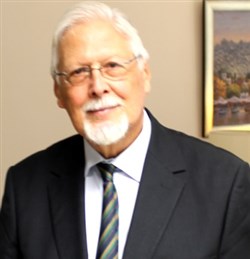BY KAMRAN BAYRAMOV (MAN/IV)
J acques Couvas, currently a senior lecturer on the faculty of Business Administration at Bilkent University, has served as CEO of several multinational companies in different parts of the world. He is also president emeritus of the European Mobile Messaging Association, and a corporate and industry advocate at the European Commission and the World Economic Forum.
acques Couvas, currently a senior lecturer on the faculty of Business Administration at Bilkent University, has served as CEO of several multinational companies in different parts of the world. He is also president emeritus of the European Mobile Messaging Association, and a corporate and industry advocate at the European Commission and the World Economic Forum.
Mr. Couvas spoke with our reporter in his office and shared his views on some contemporary business and economic issues.
Mr. Couvas, you have served as an industry and corporate advocate at the World Economic Forum. What was your overall experience like there?
The World Economic Forum is a place where you can exchange ideas. I met a lot of people, especially in the 1990s after the fall of the Communist bloc, when a lot of new politicians from Eastern Europe came up, and I was doing business in Eastern Europe because I had joint ventures in Russia and all the Visegrad countries. The Forum was a good place to meet with those new Eastern European ministers, understand how they think, and learn about the differences in their policies compared to what was the case previously. That was very enriching.
The main topic of the WEF this year concerned the “fourth industrial revolution.” Do you agree that we are at the beginning of a new era in the realms of business and technology?
In order to have an industrial revolution, you must have some drastic changes in certain areas of productivity, involving new sources of energy, or novel use of energy. What we observe now is the evolution and exploitation of the third industrial revolution. I don’t see how Klaus Schwab [founder and executive chairman of the WEF and author of the book “The Fourth Industrial Revolution”] then can justify the claim that there is a real revolution taking place, because in previous revolutions there were significant changes. Even the Internet of things is an evolution of the existing third revolution. I don’t think that we’re having a fourth revolution at present. Of course humans always progress. Nevertheless, the third revolution will likely last another 20 years.
Joseph Stiglitz, professor of economics at Columbia University, said at the WEF that the GDP of a country is not a good measurement of its wealth. Do you agree with his statement?
I agree; this was discussed in the past, even during the 1930s, but especially since the Second World War there has been debate about GDP being the right way to measure of the wealth of a nation. I think Prof. Stiglitz is correct because today we know that it is very limited. Even Christine Lagarde at the forum criticized the use of GDP, so the IMF is looking to alternative measurement standards.
Due to the changing business and technological environment, do you think that leadership will change in the future? How should companies change their organizational structures?
What we are going to see is that companies, even if they don’t want to, will have to empower people and decentralize their structures. Companies are flatter now compared to 30 years ago, and they will become flatter still and delegate more autonomy to everyone. Also, because of job insecurity, people will become more entrepreneurial and independent. The relationship between an employee and an employer will change, and an employee will become a self-employed person who signs a contract with an employer for a period of time but remains in control of his/her own destiny. I think this is going to happen because of the economic uncertainties through which we will live.
What is your opinion about the possible financial implications of Brexit for Britain?
For British businesspeople, the important thing for Britain is to be part of the Customs Union—a common market—not part of the European Union. The mayor of London, Boris Johnson, has written an article in the Telegraph where he says that he is in favor of Brexit. As you know, London is the financial capital of the world, or at least its co-financial capital with New York. He is right, because the City—the financial institutions of London—will lose out in the long term as Europe will make more and more decisions concerning all the financial institutions in every country, and the Brits are more liberal in their thinking about the economy in general. They want to keep their financial institutions self-regulated, not micromanaged by Brussels, so Johnson thinks that most people in the UK want to see the financial institutions there operate as they do today. Also, if Britain stays but has to comply with additional requirements stipulated by Brussels, some financial institutions will leave the EU. On the other side of the argument, there are people who think that if Britain leaves the EU, then these financial institutions will move to continental Europe in order to maintain their business relations. Right now it looks like Brexit is going to win, maybe by a couple of percentage points, as Eurosceptics are on the up at this moment.
Mr. Couvas, what about your hobbies and interests?
Actually, I don’t have that many hobbies, but I like swimming, and I like photography and cinema. I’ve been doing photography since I was eight years old, when I got my first camera, and I like to photograph people.
Do you have a favorite book?
My favorite is Leo Tolstoy’s “War and Peace,” but I also like “The Count of Monte Cristo” by Alexandre Dumas, as well as modern Anglo-Saxon literature and, on the classics side, Aristotle and Marcus Aurelius.
